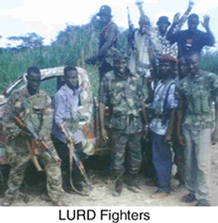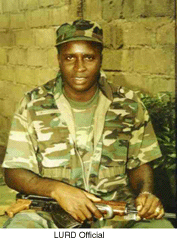President Charles Taylor has declared a state of emergency in Liberia. The West African nation has been battling dissidents in the northwest since 1999. Since then, the hapless people of Lofa, and now Gbarpolu Cou nty, have been constantly terrorized. Amnesty International reported in 2001 that members of the so-called Anti-Terrorist Unit (ATU) of the Taylor government were terrorizing Lofa citizens (including raping women). Amnesty also pointed finger at LURD members - accusing them of similar abuses.
nty, have been constantly terrorized. Amnesty International reported in 2001 that members of the so-called Anti-Terrorist Unit (ATU) of the Taylor government were terrorizing Lofa citizens (including raping women). Amnesty also pointed finger at LURD members - accusing them of similar abuses.
Just recently, it was reported that the dissidents captured the village of Sawmill located about 80 miles from Monrovia which created a stampede - thousands of refugees had to flee the village. However, a few days later, Liberian government officials reported that the village had been recaptured by government forces. Most recently, when this magazine interviewed former spokesman and current military advisor of LURD, Gen. Joe Wylie, he denied that LURD had a presence in Sawmill. He said that the Liberian government staged the Sawmill development, using the ATU and argued that it did not make strategic military sense for LURD to place its fighters in areas that were heavily populated.
It was reported on Friday that LURD attacked Klay. LURD's spokesman, William Hinson, is quoted as saying: "We have thousands of soldiers who have the capacity to take Monrovia in 72 hours... But we want to offer Charles Taylor the opportunity to resign and leave."
However, Liberia's Defense Minister Daniel Chea who said he was speaking from Klay told reporters via phone, ``I am speaking to you from Klay. The guys are no longer in the town [Klay], don't mind their war propaganda claims that they are there and here.''
These claims and counter claims are not only conflicting but continue to be made without any independent clarification. This practice continues to persist. Yesterday, for example, the LURD spokesman, Charles Bennie speaking from the Netherlands told BBC that LURD would soon be in control of Klay Junction on the main road to Monrovia. This was followed by the Liberian information Minister, Mr. Reginald Goodridge, confirming the fighting on the same BBC program, but said that the government forces were in control of the area.
 Announcing the imposition of the state of emergency yesterday, President Taylor said in a statement:
Announcing the imposition of the state of emergency yesterday, President Taylor said in a statement:
“It is common knowledge that barely two years following the inauguration of this government, the sovereign territory of the Republic of Liberia was attacked in April 1999 by terrorists operating out of Guinea. In August of the same year, the Liberian territory was once again violated when the country suffered another onslaught on its territory and people.
“From 1999 to this date, this country has been at war with insurgents who are being supported by some of our neighbors. While the reign of terror goes unabated, the international community remains mute to the plight of the Liberian people.
“The arms embargo and sanctions imposed upon the Liberian people have hampered the ability of our government to effectively defend our country and provide for the well being of our citizens and the embargo serves as an incentive for these continued attacks against the Republic of Liberia…
“If we must hold elections in this country in the year 2003, the people of this country have to be united in their desire and action in bringing the war to an end.
“In keeping with Article 86 of the Liberian Constitution, I hereby declare and proclaim the existence of a state of emergency in the republic.
Few months ago, the idea of imposing the state of emergency was floated by Mr. Taylor, the National Chairman of his party (Mr. Cyril Allen) and some members of his inner circle, using the war in northwest Liberia as the reason for imposing the emergency powers. It is not clear whether the action taken by Mr. Taylor is aimed at canceling the ensuing 2003 elections or another gimmick to harass opposition leaders.
Here is what the Liberian constitution says about Emergency Powers (Chapter IX):
Article 85
The President, as Commander-in-Chief of the Armed Forces, may order any portion of the Armed Forces into a state of combat readiness in defense of the Republic, before or after the declaration of a state of emergency, as may be warranted by the situation. All military power or authority shall at all times, however, be held in subordination to the civil authority and the Constitution.
Article 86
a. The President may, in consultation with the Speaker of the House of Representatives and the President Pro Tempore of the Senate, proclaim and declare and the existence of a state of emergency in the Republic or any part thereof. Acting pursuant thereto, the President may suspend or affect certain rights, freedoms and guarantees contained in this Constitution and exercise such other emergency powers as may be necessary and appropriate to take care of the emergency, subject, however, to the limitations contained in this Chapter.
b. A state of emergency may be declared only where there is a threat or outbreak of war or where there is civil unrest affecting the existence, security or well-being of the Republic amounting to a clear and present danger.
Article 87
a. Emergency powers do not include the power to suspend or abrogate the Constitution, dissolve the Legislature, or suspend or dismiss the Judiciary; and no constitutionals amendment shall be promulgated during a state of emergency. Where the Legislature is not in session, it must be convened immediately in special session and remain in session during the entire period of the state of emergency.
b. The writ of habeas corpus shall remain available and exercisable at all times and shall not be suspended on account of any state of emergency. It shall be enjoyed in the most free, easy, inexpensive, expeditious and ample manner. Any person who suffers from a violation of this right may challenge such violation in a court of competent jurisdiction.
Article 88
The President shall, immediately upon the declaration of a state of emergency, but not later than seven days thereafter, lay before the Legislature at its regular session or at a specially convened session, the facts and circumstances leading to such declaration. The Legislature shall within seventy-two hours, by joint resolution voted by two-thirds of the membership of each house, decide whether the proclamation of a state of emergency is justified or whether the measures taken thereunder are appropriate. If the two-thirds vote is not obtained, the emergency automatically shall be revoked. Where the Legislature shall deem it necessary to revoked the state of emergency or to modify the measures taken thereunder, the President shall act accordingly and immediately carry out the decisions of the Legislature.